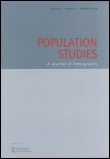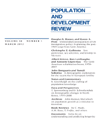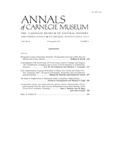
POPULATION STUDIES-A JOURNAL OF DEMOGRAPHY
Scope & Guideline
Unraveling the Complex Tapestry of Demographic Change
Introduction
Aims and Scopes
- Demographic Analysis:
The journal focuses on quantitative and qualitative analyses of demographic data, employing statistical and modeling techniques to understand population trends, structures, and changes over time. - Social Determinants of Demography:
Research often examines the impact of social factors such as education, socio-economic status, and cultural contexts on demographic behaviors, including fertility, migration, and mortality. - Health and Mortality Studies:
A significant portion of published works investigates health outcomes and mortality rates, linking them to demographic variables and identifying disparities among different population groups. - Migration Patterns:
The journal emphasizes the study of migration, both internal and international, analyzing how migration affects demographic profiles, family structures, and economic conditions. - Family Dynamics and Life Courses:
Research frequently explores family structures, trajectories, and life course events, considering how these elements are influenced by broader societal changes and policies. - Comparative and Historical Demography:
The journal also includes comparative studies across different countries and historical analyses, providing insights into demographic transitions and their implications.
Trending and Emerging
- Impact of Climate Change on Demography:
There is a growing emphasis on understanding how climate change affects demographic patterns, including migration and fertility, as researchers seek to address the implications of environmental changes. - Health Disparities and Social Inequality:
Recent studies increasingly focus on health disparities across different socio-economic groups, examining how inequalities impact life expectancy and health outcomes within populations. - Pandemic-Related Demographic Changes:
The COVID-19 pandemic has prompted a surge in research analyzing its effects on fertility, mortality, and migration patterns, indicating a critical shift in demographic research priorities. - Intersectionality in Family Dynamics:
Emerging studies are exploring family trajectories through an intersectional lens, considering how race, class, and gender interact to shape family structures and outcomes. - Technological Influence on Demography:
Research is increasingly examining how technology, including internet access and digital communication, influences demographic behaviors such as partnership formation and childbearing.
Declining or Waning
- Traditional Fertility Studies:
Research on traditional fertility patterns, particularly in stable contexts, has seen a decrease as scholars shift towards examining the complexities of fertility in changing socio-economic environments. - Single-Nation Studies:
The focus on single-nation demographic studies appears to be declining, with an increasing preference for comparative and cross-national analyses that provide broader insights into demographic trends. - Static Population Models:
There has been a noticeable decline in the use of static models in favor of dynamic modeling approaches that capture the continuous changes in populations and their behaviors. - Gender-Specific Analysis of Mortality:
While gender differences in mortality have been explored, the frequency of solely gender-focused mortality studies is decreasing as researchers adopt more intersectional approaches that consider multiple demographic factors.
Similar Journals

Papeles de Poblacion
Fostering understanding through open-access research.Papeles de Población, published by the Universidad Autónoma del Estado de México, is a prominent open-access journal that has been advancing the field of demography since its inception in 1997. With an ISSN of 1405-7425, this journal aims to foster a deeper understanding of population studies through research articles, reviews, and critical analyses that address the complex dynamics of demographic changes, social structures, and their implications. While currently ranked in the fourth quartile of its category in 2023, it serves as a significant channel for researchers, professionals, and students to disseminate and access cutting-edge findings. Open access since 2004, it provides a platform for broader readership and knowledge sharing, thus contributing to the global discourse on population issues. Based in Mexico, the journal is committed to embracing diverse perspectives, emphasizing the importance of regional studies within a global context.

JOURNAL OF POPULATION RESEARCH
Transforming data into impactful demographic knowledge.JOURNAL OF POPULATION RESEARCH, published by Springer, is a premier journal dedicated to advancing the field of demographic studies. With a focus on research that addresses the complexities of population dynamics, this journal serves as a vital platform for scholars, practitioners, and students alike. It holds a commendable Q2 ranking in the Demography category for 2023, underscoring its influence and commitment to quality research. The journal spans a rich convergence of knowledge from 2005 to 2024, covering key developments and emerging trends in population research. Although it operates under a traditional access model, its impact continues to resonate throughout the academic community, highlighting the importance of robust demographic analysis in policy and planning. By fostering insightful discussions and providing access to groundbreaking studies, the JOURNAL OF POPULATION RESEARCH remains an essential resource for those eager to deepen their understanding of population issues.

Comparative Population Studies
Fostering dialogue through comparative demographic research.Comparative Population Studies is an esteemed open-access journal published by the BUNDESINSTITUT BEVOELKERUNGSFORSCHUNG in Germany, dedicated to advancing the field of demography. Since its launch and transition to open access in 2010, the journal has provided a platform for researchers to share innovative population studies, promoting a deeper understanding of demographic trends and patterns globally. With an impressive Q2 rank in Demography within the 2023 quartile categories and a commendable rank #61 out of 139 in Scopus' Social Sciences Demography classification, it plays a vital role in disseminating rigorous research. The journal covers a range of topics related to population dynamics, migration, and social implications, making it invaluable to academics, professionals, and students in the field. With an emphasis on comparative studies, Comparative Population Studies not only fosters scholarly dialogue but also enhances policy-making and economic planning. Located at Friedrich-Ebert-Allee 4, Wiesbaden 65185, Germany, the journal continues to be a prominent resource for those eager to engage with the latest demographic research.

DEMOGRAPHY
Fostering critical discourse in the realm of demography.DEMOGRAPHY is a prestigious, peer-reviewed journal published by DUKE UNIVERSITY PRESS, dedicated to advancing the field of demography through scholarly research and critical discourse. With an esteemed Q1 ranking in Social Sciences and an impressive Scopus rank of #10 out of 139 in the category, this journal holds a 93rd percentile status, reflecting its significant impact on the academic community. Covering a wide range of topics related to population studies, including fertility, mortality, migration, and demographic change, DEMOGRAPHY serves as a vital resource for researchers, professionals, and students alike. Since its inception in 1964, it has provided a platform for innovative studies and influential articles that address both theoretical frameworks and applied research. Although not an open-access journal, it ensures that its contributions reach a global audience while maintaining rigorous academic standards. Engage with DEMOGRAPHY to explore and contribute to the dynamic discussions shaping our understanding of human populations in a complex world.

POPULATION AND DEVELOPMENT REVIEW
Advancing Knowledge at the Intersection of Demography and Development.Population and Development Review is a prestigious academic journal published by Wiley, recognized for its comprehensive exploration of the intersections between population dynamics and development processes. Since its inception in 1976, the journal has contributed significantly to the field, featuring rigorous peer-reviewed articles that address pressing issues in demography, development, and sociology, maintaining a commendable reputation with a Q1 ranking across multiple categories as of 2023. With an impact factor that reflects its influence—ranking in the 90th percentile in Sociology and Political Science, and 85th percentile in Development—this journal serves as a vital resource for researchers, policy-makers, and students alike. It is instrumental in fostering dialogue and disseminating knowledge that shapes and informs public policy and academic inquiry. Although not an open-access publication, it remains accessible through various academic institutions, ensuring that its valuable insights are available to a broad audience eager to engage with the complexities of population and development.

ANNALS OF CARNEGIE MUSEUM
Exploring Earth's Secrets: A Scholarly Journey Through Natural HistoryANNALS OF CARNEGIE MUSEUM, published by the Carnegie Museum of Natural History in the United States, stands as a significant forum for scholarly research in the fields of Ecology, Evolution, Behavior, Systematics, and Geology. With an established history from 1990 to 2024, this journal caters to the scientific community by fostering the dissemination of high-quality, peer-reviewed articles that enhance our understanding of Earth's biological and geological processes. Notably recognized in the 2023 category quartiles, the journal ranks in Q2 for both Ecology and Geology, showcasing its importance and relevance in these disciplines. Although it currently does not offer open access options, the journal's rigorous editorial standards and impactful research, evidenced by its Scopus rankings, make it an indispensable resource for researchers, professionals, and students aiming to contribute to the advancing knowledge of natural history. The ISSN 0097-4463 and E-ISSN 1943-6300 facilitate easy access to its comprehensive archives, ensuring that vital insights into the natural world are readily available for ongoing scholarly exploration.

Journal of Demographic Economics
Unlocking the Potential of Population Trends for Economic GrowthThe Journal of Demographic Economics, published by Cambridge University Press, stands as a leading interdisciplinary platform dedicated to the exploration and advancement of research in the intertwined fields of demography, economics, and geography. With an impact factor that reflects its esteemed position—ranking in the Q1 quartile for Demography (2023)—the journal fosters scholarly dialogue through high-quality articles that elucidate the complex interactions between population dynamics and economic trends. Operating under an open access model, the journal ensures that its findings are widely accessible, promoting inclusivity and engagement among researchers, professionals, and students alike. The Journal of Demographic Economics endeavors to bridge gaps in knowledge by publishing innovative and rigorous studies, thereby contributing significantly to both theoretical frameworks and practical applications across various domains. Drawing submissions from a global audience, this journal not only enhances the understanding of demographic transitions but also informs policy decisions and socioeconomic development strategies, making it an essential resource for those invested in demographic and economic research.

European Journal of Population-Revue Europeenne de Demographie
Exploring the Dynamics of Population in EuropeWelcome to the European Journal of Population-Revue Europeenne de Demographie, a premier scholarly publication dedicated to advancing the field of demography. Published by Springer since 1985, this journal has established itself as a vital resource for researchers, professionals, and students interested in population studies, evidenced by its Q1 ranking in Demography for 2023 and a notable Scopus ranking within the top 20% of its category. With an ISSN of 0168-6577 and an E-ISSN of 1572-9885, the journal provides a platform for high-quality, peer-reviewed research, contributing to the understanding of population dynamics and demographic trends across Europe and beyond. Although currently not open access, the journal ensures broad mobility of knowledge through diverse access options, aspiring to bridge theoretical insights and practical applications crucial for policy-making and societal engagement. Join us in exploring the intricate tapestry of demographic data as we examine pressing issues such as migration, fertility, mortality, and population aging in an ever-evolving global context.

HERALD OF THE RUSSIAN ACADEMY OF SCIENCES
Illuminating the Intersection of Culture and PoliticsHERALD OF THE RUSSIAN ACADEMY OF SCIENCES is a prominent interdisciplinary journal published by MAIK NAUKA/INTERPERIODICA/SPRINGER, specializing in the fields of cultural studies and political science. With an ISSN of 1019-3316 and an E-ISSN of 1555-6492, this journal features a robust platform for disseminating high-quality research that informs contemporary debates in social sciences. Over its converged years from 2005 to 2024, it has established itself as an influential source of scholarly articles, achieving a Q2 ranking in Cultural Studies and a Q3 ranking in Political Science and International Relations for 2023. The journal is recognized for its valuable contributions, with Scopus ranks reflecting a strong presence in both cultural studies (Rank #444/1304, 65th percentile) and political science (Rank #450/706, 36th percentile). Researchers, professionals, and students seeking to advance their understanding of the societal dynamics at play are encouraged to explore the insightful perspectives offered by this esteemed publication.

Journal of Population Ageing
Unveiling Insights into Ageing PopulationsThe Journal of Population Ageing, published by SPRINGER INT PUBL AG, stands as a prominent platform for the exploration and dissemination of research within the fields of demography, geography, and sociology. With an ISSN of 1874-7884 and an E-ISSN of 1874-7876, this journal navigates the complexities of population ageing, a vital topic as societies worldwide confront the implications of an ageing demographic. The journal boasts impressive Scopus rankings, including the 30th rank in Demography and a 78th percentile in Sociology and Political Science, emphasizing its significant role in academic discourse. It is highly regarded in its Q2 category quartiles for Demography, Geography, Planning and Development, and Sociology and Political Science, showcasing its relevance and scholarly impact. Although not an open-access publication, the journal's carefully curated articles aim to inform and advance knowledge, making it an invaluable resource for researchers, professionals, and students invested in understanding the multifaceted challenges associated with an ageing population. With its comprehensive scope and commitment to quality, the Journal of Population Ageing continues to contribute meaningfully to the evolving conversation on demographic trends and their societal implications.